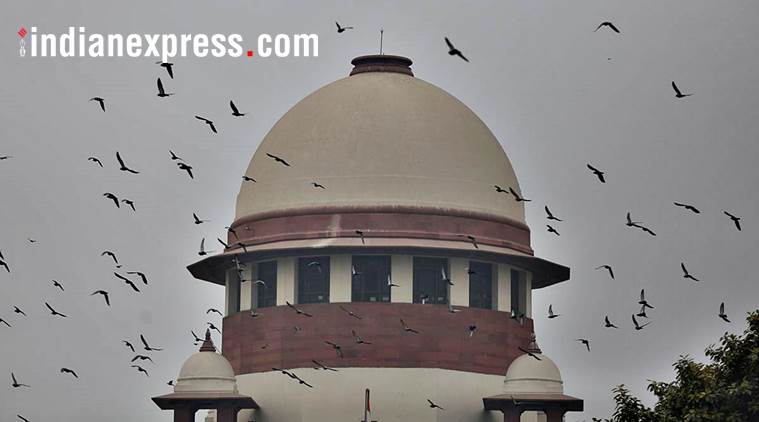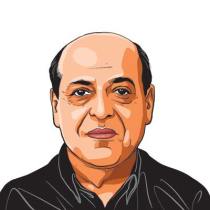The House not in order
Apex court should have stepped in and prevented lawbreakers from becoming lawmakers.

The Supreme Court.(Express Photo by Tashi Tobgyal)
The Supreme Court’s recent decision was disappointing in that it stopped short of disqualifying candidates who have alleged criminal antecedents from contesting polls, although I do understand that the Court was reluctant to step into the executive’s arena. The Supreme Court left it to Parliament to frame suitable laws to decriminalise our body politic to “cure the malignancy” from within.
Unfortunately, this is something that our parliamentarians have assiduously refused to do for the last two decades, ever since the Election Commission first approached the government to enact a suitable law in 1997. Today, almost 30 per cent of our elected representatives, both to Parliament and state assemblies, have criminal cases pending against them, half for heinous offenses. There is nothing to suggest that our parliamentarians will have changed their minds. Elections to five state assemblies and Parliament are around the corner. Let us see if any significant changes are made in the nominations by political parties.
When I was Chief Election Commissioner, I ran into the leader of an important political party at an airport lounge. I asked him why his party had recently nominated a large number of people to contest elections against whom criminal cases were pending, of whom some were alleged to have committed heinous offences such as murder, attempt to murder, extortion, rape, dacoity and kidnapping. He admitted that “winnability” was the key factor.
The Election Commission has been consistently writing to the government of the day to amend the law to bar such candidates against whom any court of law may have framed charges, upto six months before an election is announced. When this matter finally found itself before a Parliamentary Standing Committee in 2015, headed by E M Sudarsana Natchiappan, the consensus was that debarment of those charged with heinous offences, instead of a panacea, could instead become an instrument of tyranny at the hands of the political party in power, seeking vendetta against its rivals by foisting false cases on their opponents. The committee was unanimous in turning down the ECI’s proposal. They, instead, offered special courts and day-to-day trials. Twelve special courts were finally set up, but only on the orders of the Supreme Court.
Indeed, it is only the apex court that has been responsible for significant reforms in helping to cleanse the body politic. Apart from the important “disclosure” orders of 2002/2003, whereby all candidates must submit an affidavit disclosing any and all cases registered against them, the Court has, in the last few years, passed other significant orders: These relate to the distribution of “freebies”, the installation of the “NOTA” (None of the Above) button in the EVMs and by another significant order of July 10, 2013 (Lily Thomas vs Union of India), where they consciously ended the unfair privilege accorded to MPs/MLAs, which had hitherto enabled them to retain their memberships, even upon an order of conviction — by simply filing an appeal within three months. It was this decision that sent Lalu Prasad to jail and debarred him from contesting an election for six years.
In its latest order of September 25, the Supreme Court has placed the onus on Parliament and suggested better methods of disclosure, so that voters can make a more informed choice. Yet, we should be cognisant of two other unfortunate developments that have taken place over the years. The first is, many voters who feel that our country’s criminal justice system has broken down actually prefer to vote for those candidates, criminal or otherwise, whom they feel can deliver “justice” to them. Many perceive the institutions of state to be outside their reach, even as clogged courts and prohibitive lawyers’ fees fail them in their search of the settlement of their problems — on issues largely relating to property, land and social structure.
What else might help to explain why criminals have been known to win their elections even while confined to prison? Milan Vaishnav in a recent book, When Crime Pays: Money and Muscle in Indian Politics, concludes that the allure of money and criminality have actually increased such a candidate’s chances of winning. Also, the fact that our legislators,
irrespective of their political affiliations, close ranks when it comes to the issue of decriminalisation, emphasises how difficult it is to break this bastion.
irrespective of their political affiliations, close ranks when it comes to the issue of decriminalisation, emphasises how difficult it is to break this bastion.
The second depressing fact is: At one time candidates and political parties sought to bribe voters with money and freebies. It is no longer a one-way process. Now our voters have become accustomed to demanding their price! For instance, see the reports of the bypoll in R K Nagar constituency in Chennai in December 2017.
This is why I was hoping that the Supreme Court would step in and prevent lawbreakers from becoming our lawmakers.
The writer is former Chief Election Commissioner of India







































No hay comentarios:
Publicar un comentario